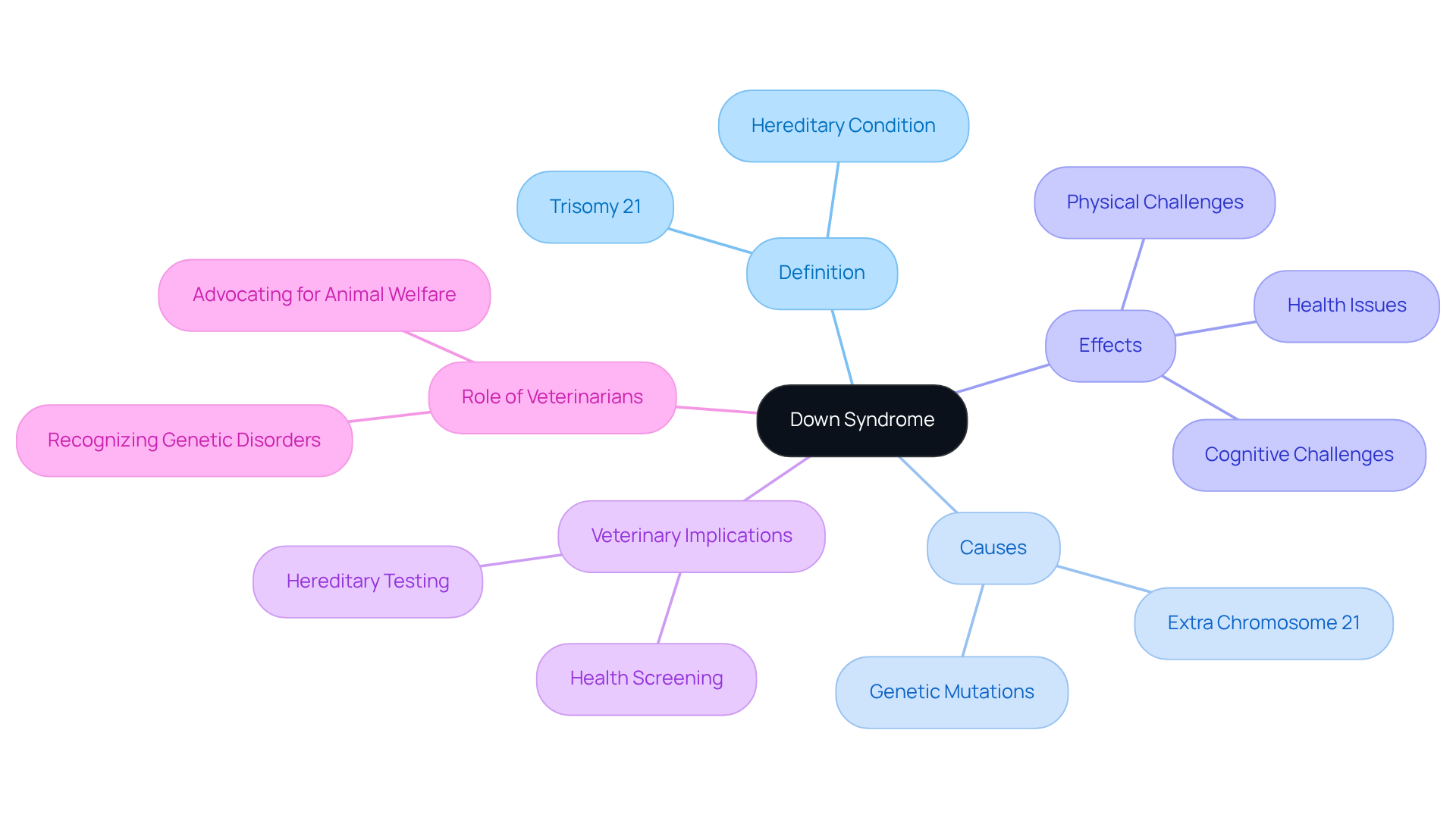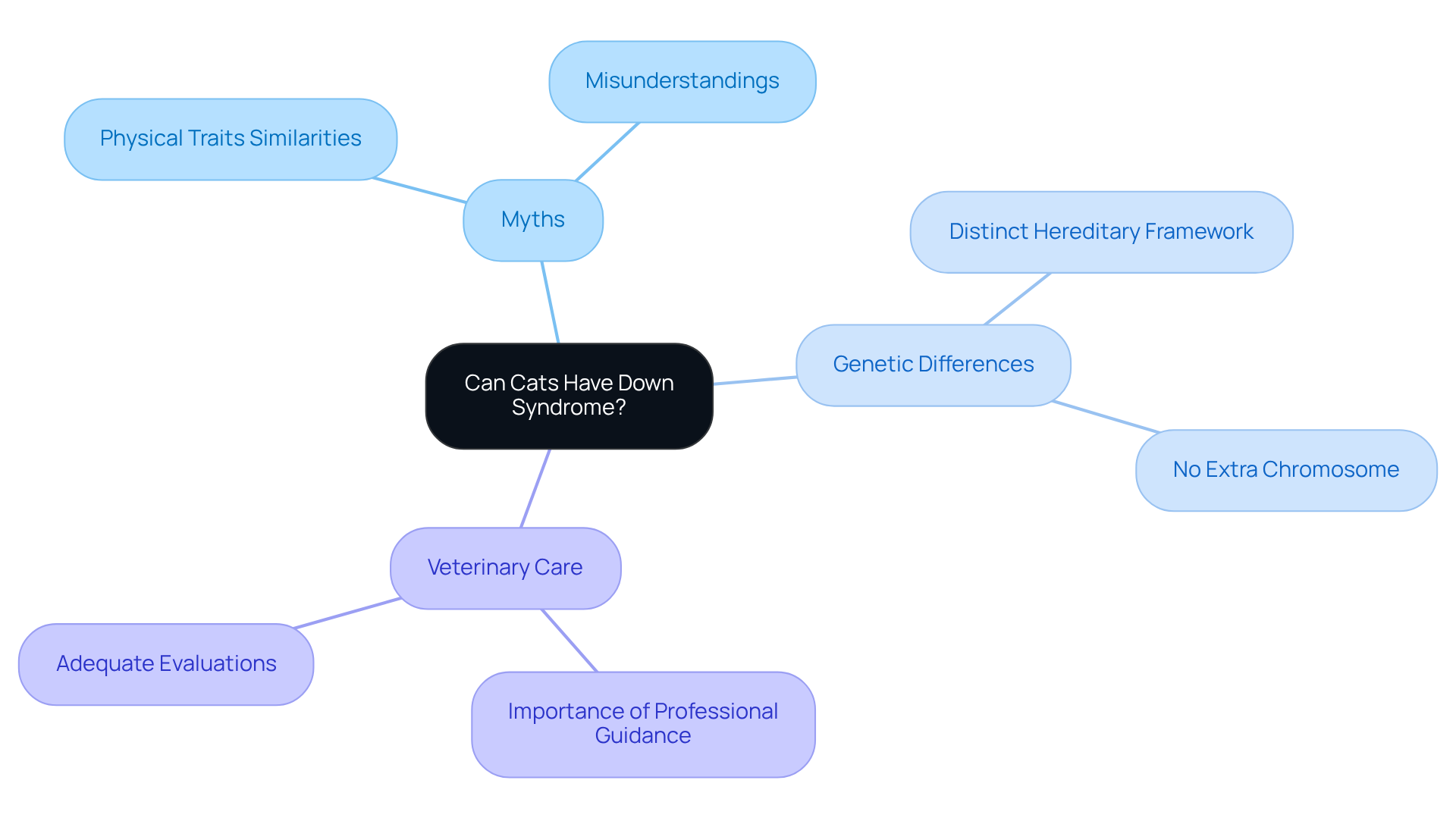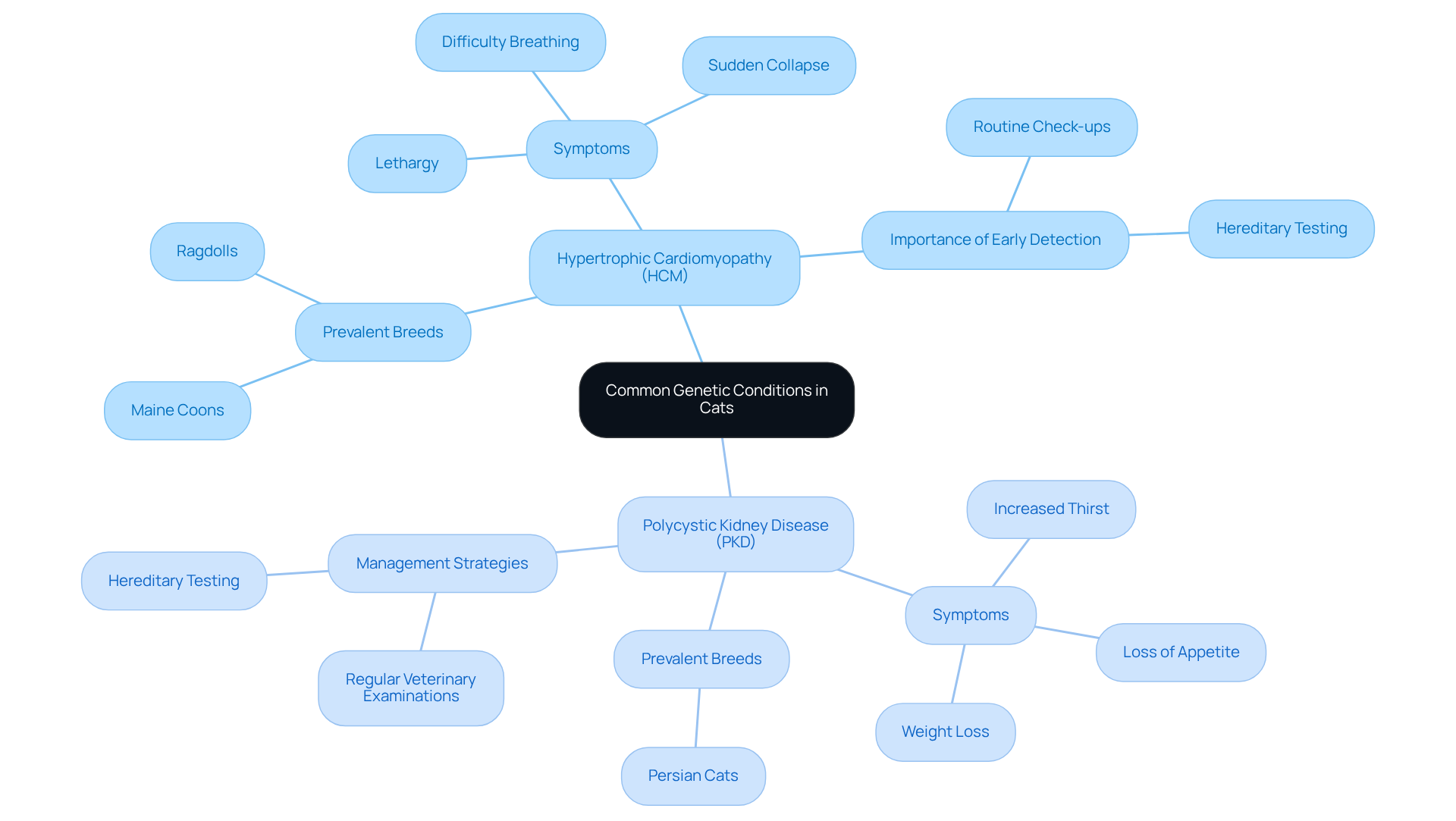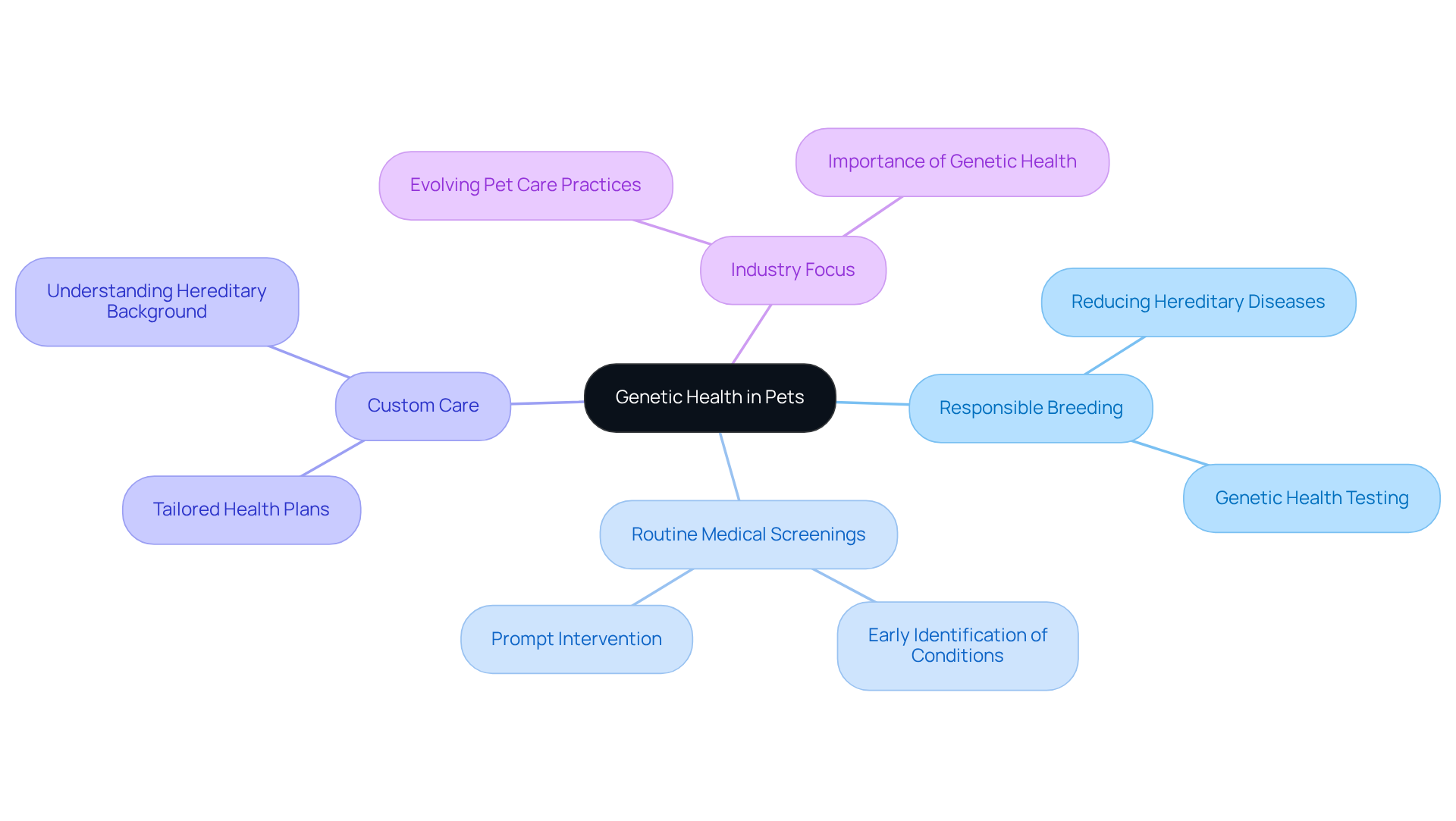
Can Cats Have Down Syndrome? Myths and Facts Explained
Overview
It’s understandable to be concerned about your beloved cat’s health, especially when faced with questions about conditions like Down syndrome. However, it’s important to know that this condition is specific to humans due to their unique chromosomal structure, which is quite different from that of our feline friends.
While some cats may show physical traits that remind us of humans with Down syndrome, these characteristics are usually associated with other hereditary conditions rather than an extra chromosome. This highlights the critical need for accurate veterinary care and thorough hereditary evaluations to ensure the best for your pet.
Remember, your cat deserves the best care possible, and seeking professional guidance can provide peace of mind and support for both you and your furry companion.
Introduction
The question of whether cats can have Down syndrome often arises among concerned pet owners, reflecting the deep love and care we have for our furry companions. It’s understandable to worry when we notice certain physical traits that seem similar to those seen in humans with this condition. However, the reality is more complex; Down syndrome is a condition uniquely defined in humans, stemming from specific chromosomal abnormalities that cats do not possess. This article aims to dispel myths and clarify facts surrounding this topic, emphasizing the importance of understanding genetic health in our beloved pets.
What are the implications of these misconceptions for pet care? How can we ensure our cherished companions receive the best possible health management? Together, we can navigate these concerns with compassion and knowledge.
Defining Down Syndrome: Understanding the Condition
Down syndrome, also known as Trisomy 21, is a hereditary condition that arises from the presence of an extra chromosome 21. For humans, this condition can lead to a range of physical and cognitive challenges, characterized by distinctive facial features, developmental delays, and various health issues. This condition occurs during cell division when an error results in an additional chromosome in the cells. Understanding Down syndrome is crucial, as it highlights the importance of hereditary health not just in humans but also in animals, leading to inquiries about whether cats can have Down syndrome.
In the realm of veterinary medicine, the question of whether cats can have Down syndrome is not officially acknowledged, given that the hereditary makeup and chromosomal structures differ significantly across species. Genetic mutations may occur spontaneously or be influenced by environmental factors, with a higher occurrence as pets age. This underlines the importance of hereditary testing and screening in veterinary practices, which can help in identifying potential health issues early on.
Veterinarians play an essential role in recognizing and addressing these genetic disorders, advocating for the well-being and welfare of animals. They ensure that pet owners are informed about potential genetic risks, fostering a supportive environment for both pets and their families. As Dr. Marty Becker wisely notes, “Veterinarians are the unsung heroes of our society,” a testament to their unwavering commitment to animal health and welfare. Their dedication is a source of comfort and reassurance for pet owners, emphasizing that they are not alone in navigating these concerns.

Can Cats Have Down Syndrome? Myths and Realities
Many pet owners often find themselves worried about their beloved felines and whether can cats have down syndrome. This concern arises from the similarities in some physical traits observed in certain animals, which can understandably lead to confusion. However, it’s important to reassure you that the question of can cats have down syndrome is clarified by the fact that it is defined only in humans. The hereditary framework of cats is quite distinct, and they lack the same chromosomal arrangements that lead to this condition.
While some cats may display physical traits that resemble those seen in humans with Down syndrome, these characteristics usually stem from other hereditary conditions or developmental issues, rather than an extra chromosome. Understanding this difference is crucial for pet owners, as it underscores the importance of providing adequate veterinary care and hereditary evaluations for your furry companions. Misunderstandings can lead to unnecessary anxiety or mismanagement of your pet’s well-being, and it’s essential to have precise information in the realm of pet care.
By staying informed and seeking professional guidance, you can ensure that your feline friend receives the best possible care tailored to their unique needs. Remember, you are not alone in this journey; many pet owners share similar concerns, and together, we can navigate the complexities of pet health with compassion and understanding.

Common Genetic Conditions in Cats
While we understand that cats having Down syndrome is not a possibility, it’s important to acknowledge that they are susceptible to several hereditary disorders that can significantly affect their health. One of the most concerning conditions is Hypertrophic Cardiomyopathy (HCM). This condition causes the heart muscle to thicken, which can lead to serious complications. It’s particularly prevalent in breeds like Maine Coons and Ragdolls, with studies showing a prevalence rate of about 30% in these populations. Symptoms such as lethargy, difficulty breathing, and sudden collapse can be alarming, making early recognition essential for effective management.
Another hereditary disorder that deserves attention is Polycystic Kidney Disease (PKD), especially common in Persian cats. This condition leads to the formation of cysts in the kidneys, which can ultimately result in kidney failure over time. Symptoms often include increased thirst and urination, loss of appetite, and weight loss. Regular veterinary examinations and hereditary testing are crucial for identifying tendencies toward these conditions, allowing for proactive care and timely intervention.
Veterinary professionals emphasize the importance of being vigilant for signs of these hereditary disorders. Early detection through routine check-ups and hereditary testing can significantly enhance a cat’s quality of life. It enables prompt treatment and management strategies tailored to their specific needs, ensuring that your beloved pet receives the compassionate care they deserve.

The Importance of Genetic Health in Pets
Genetic wellness is essential for the overall well-being of our beloved animals, profoundly influencing their quality of life and lifespan. As pet owners, it’s natural to worry about potential hereditary conditions that may affect our companions. Understanding these possibilities empowers us to make informed choices regarding their care and lifestyle. For instance, responsible breeding practices can significantly reduce the prevalence of hereditary diseases, ensuring that our pets have the healthiest start in life.
Routine medical screenings play a crucial role in the early identification of potential concerns, allowing for prompt intervention when necessary. It’s comforting to know that by staying vigilant, we can help our pets lead healthier lives. Moreover, understanding an animal’s hereditary background enables us to provide customized care that meets their specific needs, ultimately enhancing their well-being and happiness.
As the pet care industry evolves, the focus on genetic health becomes increasingly important. We all desire for our pets to enjoy long, fulfilling lives, and by prioritizing genetic wellness, we can contribute to that goal. Together, let’s embrace the journey of ensuring our furry companions thrive, surrounded by love and tailored care.

Conclusion
The exploration of whether cats can have Down syndrome brings to light a significant distinction between human and feline genetics. It’s completely understandable for pet owners to have concerns, and it’s important to clarify that Down syndrome, characterized by an extra chromosome 21, is a condition unique to humans. Cats have a different chromosomal structure, which means that Down syndrome cannot occur in felines.
Throughout this discussion, we’ve shared valuable insights about hereditary conditions that can affect our beloved cats, such as:
- Hypertrophic Cardiomyopathy
- Polycystic Kidney Disease
These conditions underscore the importance of understanding feline genetic health and the necessity of regular veterinary care. By recognizing symptoms and seeking proactive medical attention, pet owners can ensure their cats receive timely interventions, ultimately enhancing their quality of life.
Prioritizing genetic health in our pets is crucial for their well-being. By staying informed and advocating for responsible breeding practices, pet owners can play a vital role in fostering a healthier future for their feline companions. Embracing the significance of genetic wellness not only alleviates unnecessary worries but also nurtures a supportive environment where pets can thrive, surrounded by love and attentive care.
